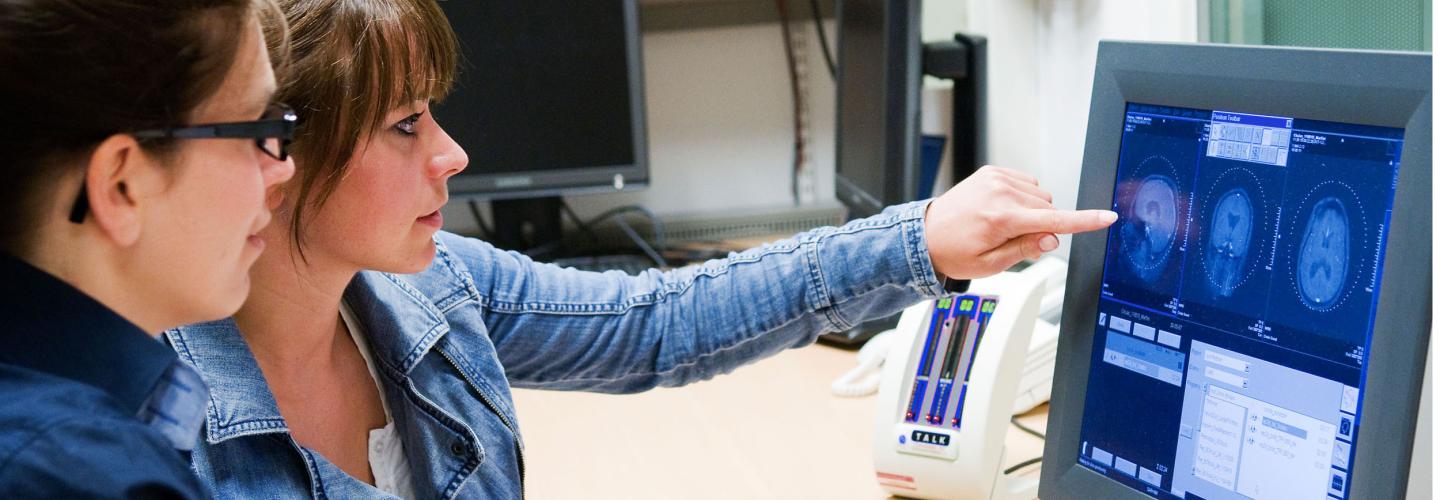Why this programme
In the Cognitive Neuroscience specialisation, you'll study the human brain and how it relates to cognition, perception and behaviour. The programme combines in-depth knowledge on human brain function and cognition with practical training in applying non-invasive brain imaging techniques such as EEG and fMRI.
Is it right for me?
- want to understand normal and/or abnormal brain function using brain imaging techniques
- are eager to translate cognitive neuroscience theories into empirical research questions
- want to gain practical knowledge and skills in the acquisition and analysis of EEG and fMRI data
- have an undergraduate degree in psychology, biology or a related field
- want an academic or research-based career
Study key issues in perceptual and cognitive brain research
By addressing key issues in perceptual and cognitive brain research, you will build a detailed understanding of how the ‘working’ brain perceives, feels, moves and attends to relevant information. Specific course topics include auditory and visual perception, attention, language and sensorimotor functions. In addition, you will learn to translate this knowledge in empirical research by hands-on training in all aspects of the experimental cycle, including experimental design, recording brain activation data, data analysis and interpretation. Methods that you will learn to apply include fMRI and EEG, as well as data analysis in the software packages Brainvoyager and EEGLAB.
Excellent staff, excellent facilities
You will work within an international and multidisciplinary team that includes psychologists, biologists, physicians, engineers, physicists, and computer scientists: all members of the Maastricht Brain Imaging Center (MBIC). This center offers a unique research infrastructure with the newest ultra-high field imaging facilities.
The Cognitive Neuroscience specialisation focuses on the normal brain and the acquired knowledge directly contributes to clinical applications such as:
- neurofeedback for the treatment of depression
- brain-based communication in locked-in patients
- guiding brain recovery after stroke or brain injury
Learn more about the institute at the Maastricht Brain Imaging Center website.
Problem-Based Learning
At Maastricht University we use Problem-Based Learning (PBL). You will work in small groups of up to twelve students on ‘problems’ inspired by real-world issues. You will discover factual knowledge, but also learn to collaborate with others, give presentations, conduct scientific research, and practice professional skills. Together, you will seek solutions and come up with answers. You'll work independently, but you will typically be guided by a tutor or mentor.
International classroom
Maastricht University is focused the development of its International Classroom, a place where our differences become our strengths. From day 1, you’ll be challenged with differing viewpoints and experiences as you interact with staff and students from all over Europe and the world. Your preconceptions and worldview will be enhanced by this interaction, bringing you closer to the programme’s goal of teaching students not only facts and concepts but also international accessibility and understanding. Roughly 50% of the students in this master’s programme come from outside the Netherlands. Such diversity creates an international atmosphere that is strengthened by the international orientation of the programme.
Internship & thesis
Research internship
The research internship gives you the opportunity to participate in the ongoing research of the faculty’s academic staff or to work with external academic or clinical institutions. You will design and pursue your own research question, which will be the foundation of your master's thesis.
You can choose the subject of your research internship from a wide variety of topics that fit within your chosen specialisation. The internship can be done in the Netherlands or abroad.
Internship & thesis topics
In recent years, internship and thesis topics have included:
- fundamental brain research: mapping auditory space in the temporal cortex; audio-visual interactions in the brain
- applied brain research: fMRI investigation of food reward processing; EEG investigation of attention biases when perceiving health messages
- clinical research: learning and memory in mice models of Alzheimer’s disease; noninvasive brain stimulation (TMS) in fundamental and clinical research
Going for a PhD?
Would you like to pursue a PhD? You may also want to consider Maastricht University’s research master's in Cognitive and Clinical Neuroscience. In this two-year programme, you’ll combine courses on cognitive neuroscience with courses that specifically focus on improving your academic skills.

PREMIUM honours programme
PREMIUM is our Honours programme for high-performing master’s students. If selected, you will work in an interdisciplinary team on a project for a real client from the public or private sector (e.g. Cisco, DHL, EcoAct). Along with guidance from a project mentor, you will receive individual coaching focused on your personal and professional development. You will also attend several workshops and events designed to cultivate valuable knowledge and skills, as well as build a network that provides you with the best preparation possible for the job market.
Are you up for the PREMIUM challenge?
